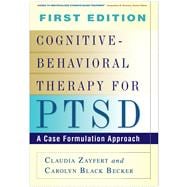
Note: Supplemental materials are not guaranteed with Rental or Used book purchases.
Purchase Benefits
What is included with this book?
Claudia Zayfert, PhD, a clinical psychologist and an Associate Professor of Psychiatry at Dartmouth Medical School, has been involved in treatment, research, and training related to PTSD for over 15 years. She completed her doctoral degree at West Virginia University and was a Research Associate at the National Center for PTSD. She is Director of the Anxiety Disorders Service and the Posttraumatic Stress Disorder Treatment Program in the Department of Psychiatry at Dartmouth Hitchcock Medical Center. Dr. Zayfert's primary interests have been the treatment of PTSD with comorbid conditions. Her current research is focused on treatment of posttraumatic insomnia. Dr. Zayfert has published extensively and has presented at national and international conferences to promote the use of empirically supported treatments for anxiety disorders in clinical practice. She routinely provides training and consultation regarding cognitive-behavioral treatments for complicated PTSD.
Carolyn Black Becker, PhD, is an Associate Professor of Psychology at Trinity University, San Antonio. Trained at Rutgers University, Dr. Becker is a practicing clinical psychologist who specializes in the treatment of PTSD, anxiety disorders, and eating disorders. She has over 14 years of experience with cognitive-behavioral treatments for a variety of anxiety disorders, including PTSD. The primary focus of her teaching, research, and clinical work is the implementation of scientifically supported prevention and treatment interventions in clinical settings. In addition to numerous publications on these topics, Dr. Becker regularly presents at national and international conferences and provides training and consultation to clinicians.
| Cognitive-Behavioral Therapy for PTSD: Overview and Empirical Foundation | p. 1 |
| What Is CBT? | p. 2 |
| What Is CBT for PTSD? | p. 3 |
| Summary of Research on CBT for PTSD | p. 4 |
| Conclusion | p. 8 |
| Cognitive-Behavioral Conceptualization of PTSD | p. 9 |
| Rationale for Learning to "Think" Cognitive-Behaviorally | p. 9 |
| Conceptualization of PTSD | p. 10 |
| Exposure and Cognitive Restructuring | p. 19 |
| Conclusion | p. 20 |
| Assessment, Case Conceptualization, and Treatment Planning | p. 21 |
| Assessment of PTSD | p. 22 |
| Using Nomothetic Models to Develop Evidence-Based Idiographic Formulations | p. 25 |
| Case Formulation: Sophie | p. 30 |
| Case Formulation: Morgan | p. 33 |
| Using the Case Formulation to Decide on the Focus of Treatment: Where to Start? | p. 38 |
| Sequential versus Simultaneous Treatment | p. 40 |
| Session Planning: Developing an Initial Template | p. 41 |
| Building the Formulation with Your Patient and Informed Consent | p. 41 |
| Conclusion | p. 43 |
| Embarking on Treatment: Clearing the Path for Success | p. 44 |
| Becoming a Team: The Therapeutic Relationship | p. 44 |
| Addressing Your Own Issues | p. 46 |
| "I Feel Confident: Which Techniques Should I Use?" | p. 50 |
| Managing Practical Concerns and Systemic Barriers | p. 56 |
| Conclusion | p. 58 |
| Psychoeducation | p. 59 |
| Rationale and Background | p. 59 |
| Orientation to CBT | p. 60 |
| Teaching Common Reactions to Traumatic Experiences | p. 64 |
| Conclusion | p. 71 |
| Introducing Exposure Therapy | p. 78 |
| Making Sense of the Exposure Process | p. 78 |
| Implementing Exposure | p. 82 |
| Troubleshooting In Vivo Exposure | p. 96 |
| Conclusion | p. 105 |
| Imaginal Exposure | p. 119 |
| Preparing for Imaginal Exposure: The Rationale | p. 120 |
| Preparing for Imaginal Exposure: Constructing a Hierarchy and Selecting the First Memory | p. 123 |
| Conducting Imaginal Exposure: The Basic Steps | p. 127 |
| Strategies to Titrate Anxiety during Imaginal Exposure and Facilitate Engagement and Habituation | p. 132 |
| Troubleshooting | p. 138 |
| Unusual Reactions | p. 148 |
| Conclusion | p. 149 |
| Cognitive Restructuring | p. 157 |
| Why Should I Use Cognitive Restructuring? | p. 158 |
| What Is Cognitive Restructuring? | p. 159 |
| Common PTSD Thoughts | p. 177 |
| Cognitive Restructuring for PTSD: Possible Problems | p. 182 |
| Conclusion | p. 189 |
| Supplemental Tools | p. 202 |
| Dialectical Behavior Therapy | p. 203 |
| Activity Scheduling | p. 205 |
| Assertive Communication Skills | p. 206 |
| Problem-Solving Skills | p. 206 |
| Exposure for Comorbid Anxiety Disorders | p. 207 |
| Decision Analysis | p. 209 |
| Treatment for Insomnia | p. 210 |
| Treatment for Eating Disorders | p. 211 |
| Substance Abuse and Dependence | p. 213 |
| Conclusion | p. 213 |
| Putting It Together | p. 223 |
| Common Stumbling Blocks | p. 223 |
| Treating Patients with Multiple Problems: Deciding When to Transition from PTSD Treatment | p. 230 |
| Planning for Termination | p. 233 |
| Conclusion | p. 238 |
| References | p. 239 |
| Index | p. 247 |
| Table of Contents provided by Ingram. All Rights Reserved. |
The New copy of this book will include any supplemental materials advertised. Please check the title of the book to determine if it should include any access cards, study guides, lab manuals, CDs, etc.
The Used, Rental and eBook copies of this book are not guaranteed to include any supplemental materials. Typically, only the book itself is included. This is true even if the title states it includes any access cards, study guides, lab manuals, CDs, etc.